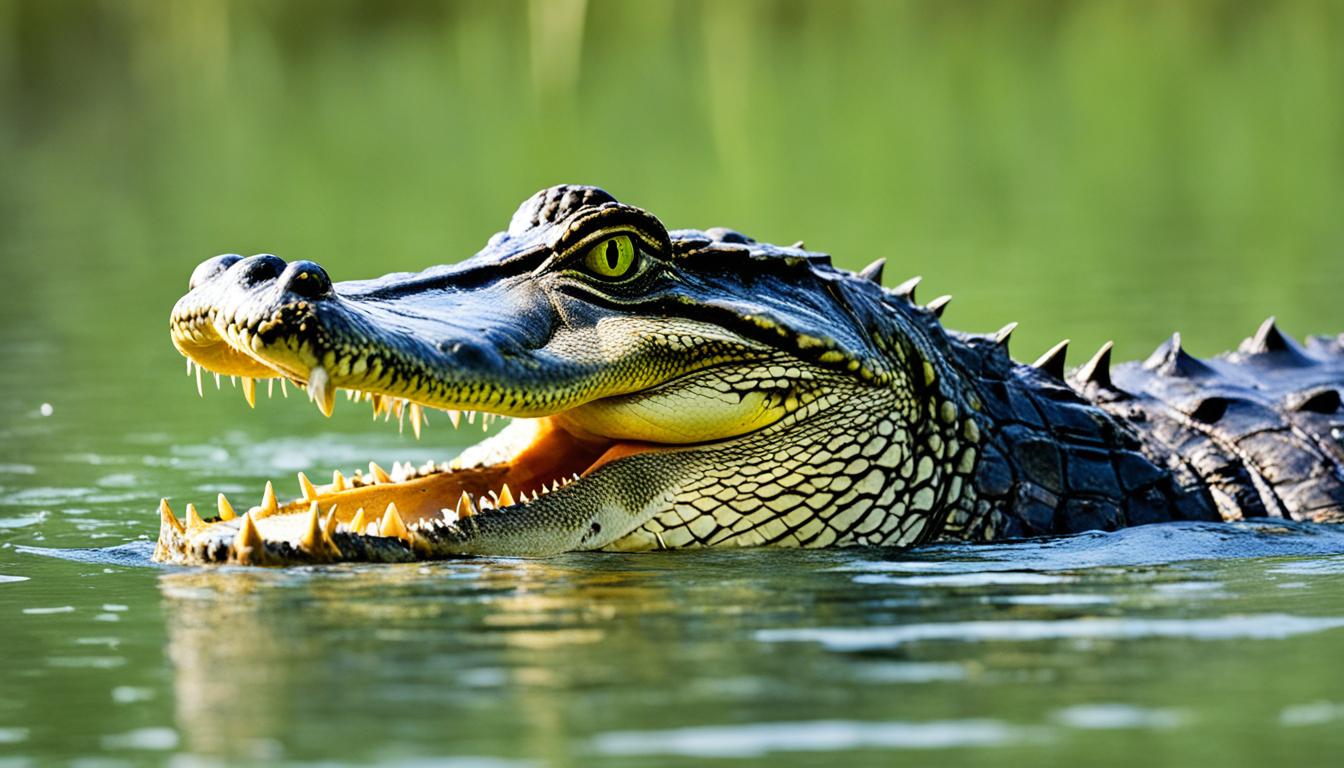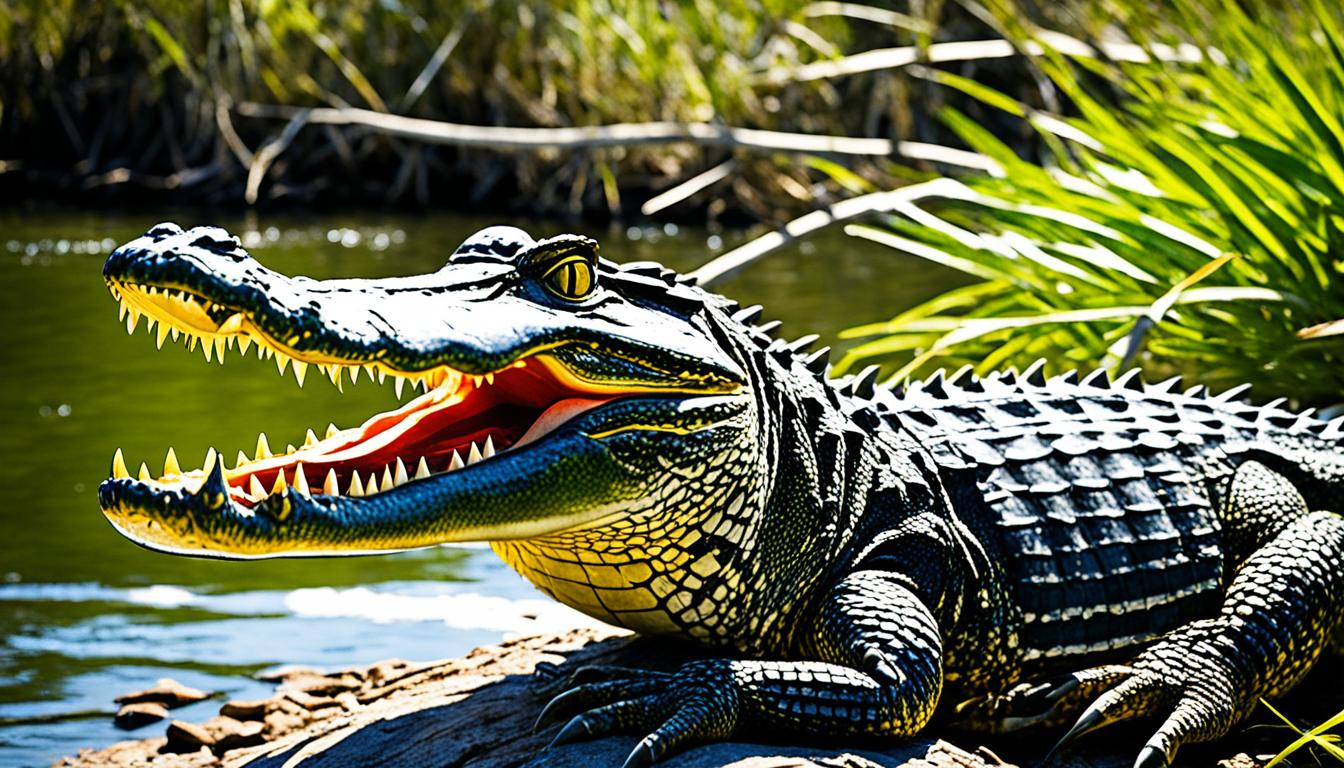I love nature and Florida’s amazing wildlife always captivates me. The American alligator, in particular, is a wonder. Many wonder if feeding these ancient animals is against the law. It’s tempting to feed them by hand. However, responsible wildlife watching protects them. Let’s look into Florida’s laws and why they exist.
Feeding wild alligators in Florida is against the law.1 The Florida Fish and Wildlife Conservation Commission (FWC) strictly forbids giving food to alligators. This regulation aims to avoid dangerous interactions with people and keep alligators’ behavior natural.
Here’s why this law is crucial. If alligators get used to human food, they can become bold.1 They might approach people more often, even becoming aggressive or defensive. Keeping a distance and not feeding them ensures they continue their natural habits. This is vital for Florida’s swamplands’ health and balance.
Key Takeaways
- Feeding alligators in Florida is strictly illegal and can result in hefty fines.
- The law is in place to prevent dangerous human-alligator conflicts and maintain the natural behavior of these reptiles.
- Alligators that become accustomed to receiving food from humans can lose their natural fear and become a threat to public safety.
- The FWC administers the Statewide Nuisance Alligator Program (SNAP) to address alligator threats in developed areas.
- Responsible wildlife viewing and maintaining a safe distance from alligators is crucial for their conservation and our own safety.
Understanding Florida’s Alligator Population
The American alligator is the state reptile of Florida. It is a great success story in conservation. It was once in danger but now there are about 1.3 million of them in the state.2 Thanks to efforts by the FWC and wildlife agencies, their numbers have rebounded.
The Success Story of Alligator Conservation
Alligators live in freshwater areas like lakes, ponds, swamps, and slow rivers across Florida’s 67 counties. They live in their natural habitats. The change in their status from “Endangered” to “Threatened” in 1977 helped manage their population. This move also protected other crocodilian species.2
Alligators’ Natural Habitat and Distribution
Florida is making big efforts to protect where alligators live. A lot of land and water is set aside for them. Conservationists in Florida work hard to support alligator populations.
Feeding wild alligators is illegal in Florida to avoid problems. For example, it can change their natural diet or even hurt them. Female alligators are very protective of their young. So, it’s crucial to not bother alligator hatchlings.2 Knowing how to act around alligators is key. For your safety, avoid being close to them, don’t swim where they are known to live, and keep a safe distance if you see one in the wild.2
Laws and Regulations Around Alligator Feeding
In Florida, you can’t feed or lure wild American alligators or crocodiles. This is in the Florida Statutes, Section 372.667. Breaking this law is a Level Two violation, bringing fines and other punishments.1
Penalties for Feeding or Enticing Alligators
Yet, there are times when feeding isn’t against the rules. For example, those with alligators in captivity for education, science, business, or fun can. They need a permit from the Florida Fish and Wildlife Conservation Commission (FWC).1 Also, FWC staff, licensed individuals, or approved animal control may feed alligators to move them. This is for the Statewide Nuisance Alligator Program (SNAP).1
Exceptions to the Feeding Prohibition
Intentional feeding of wild alligators is usually off-limits. However, the FWC sees that sometimes baiting is necessary. This could be for moving problem alligators or in special, approved cases.1 These special permissions are closely watched. The aim is to keep both people and alligators safe.1
Reasons Behind the Feeding Ban

Alligator feeding is banned in Florida to stop dangerous conflicts and protect these animals.3 When gators get food from people, they lose their fear. They may start seeing humans as food providers, leading to risky situations.3
Preventing Human-Alligator Conflicts
The Florida Fish and Wildlife Conservation Commission (FWC) bans feeding to keep gators away from humans.3 This step is needed to let gators act naturally, not as people’s suppliers. It helps keep Florida’s wetlands healthy. Gators are key to this area.3
Maintaining Alligators’ Natural Behavior
When gators aren’t scared of people, they might act defensively. This is dangerous for everyone.3 So, FWC stops people from feeding them. This way, the gators stay wild and help their ecosystem.3
Is It Illegal To Feed Alligators In Florida?
Yes, in Florida, it’s illegal to feed or attract wild alligators. The Florida Fish and Wildlife Conservation Commission (FWC) forbids the intentional feeding of American alligators or crocodiles. This rule aims to prevent dangerous interactions between humans and reptiles.1 It also ensures these creatures keep their natural behaviors. Breaking this law leads to fines and other punishments.1
The Statewide Nuisance Alligator Program (SNAP)
The FWC runs the Statewide Nuisance Alligator Program (SNAP) to deal with alligator issues in populated areas.1 If an alligator is causing trouble, the FWC might issue a permit to remove or relocate it. This is done depending on how serious the situation is.1
Reporting Alligator Feeding Incidents
The FWC asks people to report anyone seen feeding alligators. You can do this by calling 888-404-FWCC or going to MyFWC.com/WildlifeAlert.1 Feeding wildlife in Florida is dangerous because it makes them lose their fear of people. This can lead to attacks, putting the public at risk.4 Never feed bears, coyotes, foxes, raccoons, pelicans, alligators, crocodiles, cranes, or monkeys in Florida.4
In Flagler County, it’s against the law to feed animals in public places.4 At Wadsworth Park in Flagler Beach, a 5-foot alligator became too used to being fed. This situation posed a risk to visitors.4 People have spotted several alligators at the park, as seen in Tripadvisor reviews.4 To keep everyone safe, officials decided to remove the alligator from the park’s pond. This action is taken for public safety.4
Responsible Wildlife Viewing
Enjoying and learning from wildlife is great, but remember to do it safely. Wildlife viewing is best from a distance, like 50 yards away, the length of a football field.5 It’s not safe to get close to alligators or try to touch them. Watch them from afar to see their natural actions. Always follow the rules to keep everyone safe and help protect nature.
Safe Distance and Observation Guidelines
When it comes to alligator observation, keep your distance, at least 50 yards.5 It’s risky and bad for alligators if you get too close. Instead, watch from a safe spot and admire these creatures in their habitat. Doing this, you support safety, learning, and the protection of wildlife.
Alligator Safety Tips for Floridians
In Florida, big alligator injuries are uncommon, but being cautious is smart.6 Most gators in Florida avoid people. But, if they’re used to getting food from people, they might not.6 Remember, feeding alligators is against the law. It’s best to steer clear of them.6
Precautions for Swimming and Water Activities
If you swim or do water sports, stick to safe areas during the day. Gators are active at night, making daytime safe for humans.67 Gators like places with lots of plants in the water. So, avoiding spots with things like lily pads is a good move.6
Keeping Pets Safe from Alligators
Keep your pets close and away from the water. Gators might think they’re food.6 Dogs are especially at risk. Keep them at a distance from water to be safe.6 It’s wise to be at least ten feet away from gators. They can jump far and move quick.6
By being careful, Florida’s beautiful waters can be enjoyed safely alongside gators.6 Always follow the safety tips. Keeping your distance and avoiding gator teasing is key to safety.6
Legal Consequences for Alligator Harm
In Florida, harming alligators has serious legal outcomes. It is a third-degree felony to kill or injure an American alligator (Alligator mississippiensis) intentionally.8 This tough law helps protect these iconic reptiles and keeps Florida’s ecosystems balanced.
Felony Charges for Killing or Injuring Alligators
The felony offense for hurting alligators shows Florida’s dedication to wildlife and environment care.8 Breaking this law can lead to fines up to thousands of dollars and even jail time.8 The Florida Fish and Wildlife Conservation Commission (FWC) works hard to stop these crimes to save the gator population.
Licensing Requirements for Alligator Trapping and Farming
Florida also requires special licenses for those looking to trap or farm alligators. If you capture or keep an alligator or its eggs without the right permits, it’s a felony.8 This system is in place to make sure any activities related to alligators are done carefully. It’s to protect the state’s gators for the long term.
These laws reflect Florida’s strong commitment to protect its alligators.8 By following these strict rules, the state helps keep its natural areas in harmony. It aims to safeguard its alligator populations and maintain a proper balance in its environment.
Self-Defense and Alligator Encounters
Florida’s FWC wants to protect alligators. They rarely allow people to kill them in self-defense.9 You can defend yourself if an alligator attacks, or your pet, if you’re outside your home.9
Rare Circumstances for Self-Defense Claims
The FWC advises against picking fights with gators. Instead, stay away and tell the authorities about problem gators.9 It’s against the law to bother gators, unless you’re defending yourself.9
Avoiding Unnecessary Alligator Confrontations
We should focus on safety and protecting nature, living with gators safely in Florida.10 Serious gator attacks are very rare for Florida residents.10 Still, be aware and steer clear of gators, especially during mating or nesting time.9
Conclusion
I’ve learned a lot about how important it is to respect Florida’s alligator laws. It’s against the law to feed them because it can lead to risks for people and disturb the alligators.1 Florida’s alligators have made a big comeback. With 1.3 million in the state, it’s vital that we protect them and live with them safely.
Not feeding alligators and keeping a safe distance helps keep us and them safe. Reporting any problems helps too.2 We can learn to enjoy watching them responsibly. This helps keep everyone safe and the environment protected.
While enjoying Florida’s outdoors, I’ll always follow the Florida Fish and Wildlife rules.11 This way, I can help keep alligators and their habitats safe. It’s all about living together in a way that’s good for everyone.
FAQ
Is it illegal to feed alligators in Florida?
What are the penalties for feeding alligators in Florida?
Are there any exceptions to the alligator feeding ban in Florida?
Why is it illegal to feed alligators in Florida?
How can I report incidents of alligator feeding in Florida?
What are the guidelines for responsible wildlife viewing of alligators in Florida?
What precautions should Floridians take to stay safe around alligators?
Is it a crime to kill or injure an alligator in Florida?
When can self-defense be claimed in an alligator encounter in Florida?
Source Links
- https://www.switchgrassoutfitters.com/blog/2023/florida-alligator-laws-every-local-should-know.html
- https://www.switchgrassoutfitters.com/blog/2023/understanding-the-care-and-conservation-process-of-florida-gators.html
- https://www.floridabar.org/the-florida-bar-journal/alligator-harvesting-hunting-as-a-regulatory-tool-for-species-management/
- https://www.flaglercounty.gov/Home/Components/News/News/1128/15
- https://myfwc.com/wildlifehabitats/wildlife/alligator/snap/
- https://jacksonvilletraveler.com/florida-alligator-safety-tips/
- https://cms4files.revize.com/capecoralfl/docs/Living_With_Alligators.pdf
- https://www.backwoodsairboatadventures.com/blog/florida-alligator-laws-essential-knowledge-for-locals-2024/
- https://forums.paddling.com/t/alligators-and-kayaks/25049?page=3
- https://www.tcpalm.com/story/news/state/2023/02/22/how-can-i-avoid-florida-alligator-attacks-5-ways-to-keep-yourself-safe/69933487007/
- https://www.floridabar.org/the-florida-bar-journal/whos-the-real-predator-a-look-into-alligator-farming/

